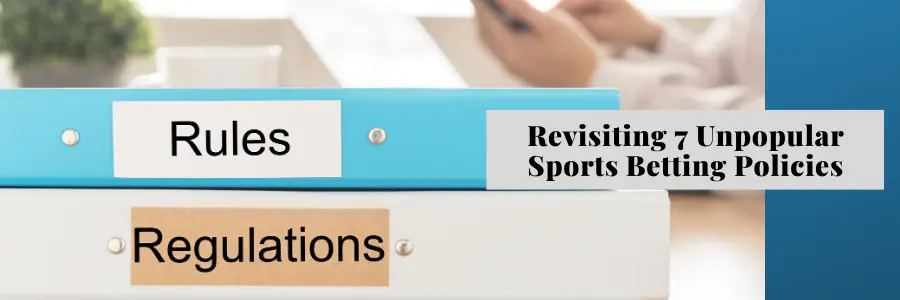How Detrimental Are Maligned Sports Betting Policies?

Once confined to Nevada, legal sports betting is now a reality in 14 states and counting. However, the rapid spread hasn’t been without complications.
Flawed legislation and policies are an expected byproduct of harried lawmakers and regulators. And when it comes to the rush to get sports betting up and running as soon as possible, there’s no shortage of head-scratching rules and regulations.
The Seven Deadly Sins
There’s no shortage of controversial policies to choose from, but by and large, the following policies (that BettingUSA.com has dubbed the Seven Deadly Sins) are the most often critiqued:
- Retail-only
- State-run monopolies
- In-person registration
- High tax rates and license fees and other burdens
- Integrity fees and official data mandates
- Prohibitions on in-state college betting
- Limitations on access and skins
Each of these policies is believed to harm the market, but in most cases, the impact is both hard to quantify at this stage of the game, as well as being market-dependent.
Retail-Only: The Greatest Misstep a State Can Make
States that don’t allow online sports betting are the most heavily criticized. And for a good reason.
There’s simply no denying that online betting swells handle and revenue. Look no further than the numbers coming out of New Jersey, and Pennsylvania,
retail-only states.
Some states missed the memo and decided against online betting for trivial reasons. But not every state that chose a retail-only sports betting industry had a choice in the matter.
In some states, the legalization of online betting would require a constitutional amendment. In other states, there isn’t an appetite for online wagering, and any sports betting bill that included an online component would be DOA.
So the choice was retail sports betting or nothing.
So while online betting is imperative to maximize handle and revenue, some states are handcuffed.
Furthermore, an online component can get added at a later date. That’s what happened in Rhode Island.
So unlike some of the more permanent items on this list, the lack of online sports betting from the get-go is correctable in most locales.
State-Run Monopolies
Several sports betting states have handed their lottery, or a single operator the proverbial keys to the kingdom. States set up as monopolies are Delaware, Rhode Island, New Hampshire, Oregon, as well as Washington DC.
The early returns are a bag of mixed results in those jurisdictions. In states with online sports betting, the presence of a monopoly doesn’t seem to be having much of an impact, even when they’re coupled with other policies from our Seven Deadly Sins list.
Based on November 2019 reporting numbers, Rhode Island (also criticized for its in-person registration and high tax rates) is more than holding its own against similarly mature sports betting states:
- Rhode Island handle per resident: $28
- West Virginia sports betting handle per resident: $19
- Pennsylvania handle per resident: $24
Delaware is a different story, as the state averaged about $10 in handle per resident in November.
Oregon is too new to provide a good comparison but seems to be holding its own, and New Hampshire launched on December 30.
In-Person Registration
States requiring customers to register mobile betting accounts at a retail location did so as a compromise. As noted above, in-person registration is better than retail-only, and if that’s what it takes to pass a bill, that’s what needs to be done.
The effect of this policy will vary by state.
Market penetration will depend on how far people have to travel to register their accounts.
In-person registration is a restrictive policy, but the alternatives for these states were retail-only or no sports betting; full online may not have been in the cards.
High Tax Rates and Licensing Fees
To all of those that argued burdensome sports betting tax rates and licensing fees would decimate a market, Pennsylvania would like to have a word with you.
That said, the jury is still out on the long-term harms these policies might bring about, or how much it’s tamping down the growth of the market.
The good news is, most states considering sports betting legislation aren’t saddling the industry with burdensome tax rates and licensing fees.
Integrity Fees and Official League Data
When the Supreme Court struck down PASPA professional sports leagues decided to pivot 180-degrees.
After leading the fight against legal sports betting, the leagues suddenly wanted to be a part of the burgeoning industry. And by part of the industry, what I mean is they wanted a cut of the revenue.
It began as an attempt to receive “integrity fees,” or as Dire Straits would term it, “Money for nothing,” the leagues have all but abandoned that strategy and shifted to the more convincing (but still controversial) argument of mandating official league data.
A few states have acquiesced on official league data on live/in-play betting, but to date, no state has succumbed to the leagues’ siren song of needing integrity fees. The states with official league data mandates are Tennessee, Illinois, and Michigan.
None of these states is up and running yet, so the impact of official league data mandates is unknown. However, what these mandates amount to is an added tax, so expect an impact similar to high tax rates and licensing fees.
Prohibitions on In-State College Betting
Prohibitions on in-state college betting are one of the more popular items on this list, and in most states, it’s also one of the least impactful. Exceptions would be states without major professional teams and massive college followings like Kentucky or Alabama.
It’s also one of the most ludicrous and falls under the umbrella of being a “feel-good” policy, as all it does is push that action into illegal markets. It doesn’t make the games safer from an integrity standpoint, and it doesn’t stop people from betting on these games.
Limiting Access
Like in-person registration, limiting access (not allowing outside companies to apply for licenses, or limiting the number of online skins a licensee can launch) is a compromise of sorts. Instead of a full-blown monopoly, the state limits who can compete, and in some cases, picks the winners and losers in a market.
Most legal sports betting states have limited license access to existing in-state operators. Pennsylvania is a market that limited the number of and independency of skins.
This stifling of competition is seen as a negative, and almost certainly is when carried out to extremes. However, but it’s not clear how impactful modest restrictions have.







